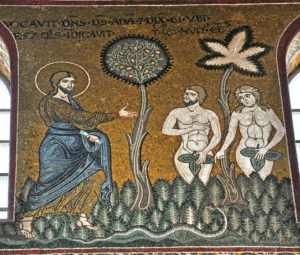Mount Calvary Church
Eutaw Street and Madison Avenue
Baltimore, Maryland
A Roman Catholic Parish of
The Ordinariate of the Chair of St. Peter
Trinity II
June 17, 2018
8:00 AM Said Mass
10:00 AM Sung Mass
Note: Sunday June 17 begins summer schedule:
One mass at 9:00 AM
Organ Prelude
Ach Gott und Herr, Johann Gottfried Walther
Hymns
Praise to the Holiest in the height
There’s a wideness in God’s mercy
A mighty fortress is our God
Organ Postlude
Ach Gott, vom Himmel sieh darein, Johann Pachelbel
___________________________________________
Prelude
Ach Gott und Herr, Johann Gottfried Walther
Here is Carlos Cappellaro playing.
________________
Hymns
Praise to the Holiest in the height is an 1865 hymn by John Henry Newman (1801—1890). The hymn is a profound meditation on 1 Corinthians 15: 20-47, in which God in Christ, the second Adam, restores the world which had been lost by the sin of the first Adam. He does so by his Incarnation: his becoming human is an even higher gift than grace. In human form he undergoes the ‘double agony’ (the agony in the garden, and the suffering on the cross) which will teach and inspire, and demonstrate the power of ‘generous love’. The actions of the Incarnate God are appropriately enclosed within the ‘praise’ motif of the first and last verses.
Like the hymn Firmly I believe and truly, it forms part of The Dream of Gerontius, which describes the passage of the soul through death. It is sung by the angels as the soul approaches judgment. Jesus, who is true God and true man, undergoes for the human race the “double agony,” the one in the garden and the one on the cross. In his Discourse 16, Newman placed equal emphasis on Jesus’ Agony in the Garden and on His Crucifixion as central to understanding the work of redemption. In the garden Jesus felt the full horror and degradation of all the sins and guilt and sorrows of the world. Newman also intimates that we his brethren should learn from Him to do our share in bearing the burden of the sins of the world.
Here is a large congregation singing it.
There’s a wideness in God’s mercy was written by Frederick Faber (1814—1863). He was born an Anglican and reared a strict Calvinist. After attending Oxford, he took orders as an Anglican priest and began his ministry as a rector. Influenced by his friend John Henry Newman (1801—1890) who converted from Anglicanism to Roman Catholicism in 1845, Faber also converted to Catholicism that same year.
Drawing inspiration from the hymns of John Newton, William Cowper and the Wesleys during his Anglican youth, he recognized that Roman Catholics lacked a tradition of more recent metrical hymnody in English. He took it upon himself to remedy this. By the time he died, he had contributed 150 hymns, all composed after his conversion to Roman Catholicism.
There are echoes of William Cowper in this hymn. Cowper (1731—1800), one of the hymn writers that influenced Faber during his Anglican youth, was an ardent Calvinist. His most famous hymn “God moves in a mysterious way” also has the sense that God’s sovereign power and understanding are far beyond human capabilities. Faber expresses this in stanza three: “For the love of God is broader than the measure of our mind.”
Here is a simple rendition.
A mighty fortress is our God is from the German translation of Psalm 46 by Martin Luther. Leading Catholic liturgical scholar and musician Edward Foley calls Martin Luther “a model pastoral musician… a proponent and composer of music from the people and for the people, as evidenced in his chorales.” Speaking specifically of Ein feste Burg—the German title for “A mighty fortress” – and after pages of careful analysis, Fr. Foley notes that this chorale “appears to be a paradigm of liturgical ‘people music.’” Luther’s “craft is affirmed by its ageless singability” — high praise from a Catholic scholar, indicating not only the quality of Luther’s work, but also its ecumenical popularity.
Here is Peterborough Cathedral, dedicated to the Christians of Iraq. The Arabic letter
stands for Nazarene, the Arabic name for Christians. Itis painted on their houses so that they can be recognized and martyred.
____________________
Postlude
Ach Gott, vom Himmel sieh darein, Johann Pachelbel
Here is its played on a modern tracker organ, similar to ours.


A Mighty Fortress??!! By the Arch Heretic Luther??! My goodness!